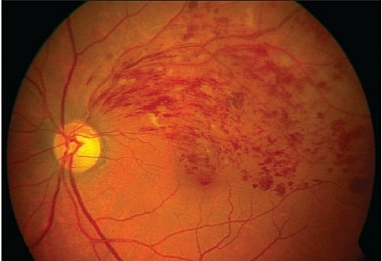 |
| The study also found that visual acuity at the return visit is influenced by baseline acuity as well as central macular thickness at various visits throughout the treatment course. Photo: NIIH. Click image to enlarge. |
Patients with macular edema (ME) secondary to retinal vein occlusion (RVO) treated with anti-VEGF need repeated treatment but are often lost to follow-up. In a recent study, researchers analyzed patients who were lost to follow-up for more than six months and found that no improvement in visual acuity and transport inconvenience were some of the contributing factors.
This retrospective study analyzed the causes and prognosis of follow-up loss in 125 RVO-ME patients treated with intravitreal anti-VEGF injections. The team collected patients’ baseline characteristics along with the number of injections received before they were lost to follow-up, primary disease, BCVA before loss to follow-up and after return visit, central macular thickness months before loss to follow-up and after, reasons for loss to follow-up and complications. They also analyzed the factors affecting visual outcome at a return visit.
After six months, 103 participants remained lost to follow-up and 22 returned. The common reason was no improvement in vision, which led patients to decline further treatment and long-term follow-up. Some stated their “unwillingness” to follow-up due to being widowed, living alone or caring for their ill partner.
Transport inconvenience was another reason, often due to long-term farming, work commitments or living far away from the hospital. Because of this, patients were unable to adhere to the prescribed follow-up schedule, and about 12% opted to visit other hospitals for further treatment, such as their local hospital with convenient transportation, the authors noted in their study.
Other reasons for follow-up loss included patients who were unwilling to visit the clinic, had already elected to seek treatment elsewhere, were not seen in time or could not afford the cost of the medication.
“Additionally, the financial burden of medical admission was another contributing factor, which added to the overall financial strain on both patients and their families. These financial pressures resulted in the majority of patients being lost to follow-up after just one injection,” the authors noted in their study.
The number of injections before loss to follow-up was a risk factor. “In contrast, most patients were lost to follow-up after one injection, suggesting that the causes of loss to follow-up are related to the number of injections patients receive,” the authors explained.
In the initial stage of treatment, patients experienced a significant improvement in BCVA; however, it tended to decrease when the frequency of injections was reduced. This shows that the number of injections in the first year is closely related to the prognosis of patients’ vision, the author noted, and patients should understand the importance of follow-up management.
“In conclusion, our study found that the main reasons for loss to follow-up in most RVO-ME patients receiving anti-VEGF therapy were no improvement in visual acuity and transport inconvenience, with effective patient management as well as follow-up improving the motivation for regular outpatient follow-up and treatment in RVO-ME patients,” the authors explained in the study. “Our findings reveal for the first time that visual acuity at the return visit is influenced by four major factors: baseline visual acuity, baseline central macular thickness, pre- loss to follow-up central macular thickness and post-return central macular thickness. In addition, the number of injections before loss to follow-up was a risk factor for loss to follow-up. Therefore, patients need to pay more attention to the visual quality and ocular anatomical hazards caused by loss to follow-up.”
Huang X, Zheng M, Lu J, et al. Analyze factors and prognosis of eyes lost to follow-up in retinal vein occlusive disease patients receiving anti-vascular endothelial growth factor therapy. BMC Ophthalmol. June 12, 2023. [Epub ahead of print]. |

